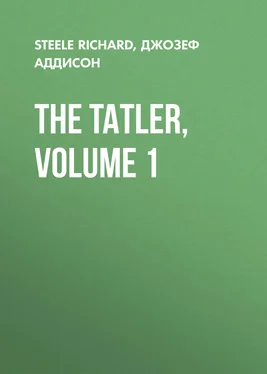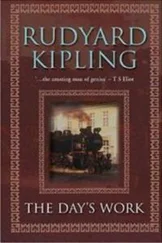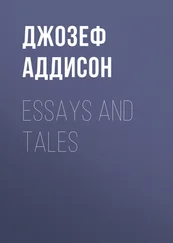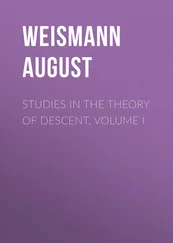Джозеф Аддисон - The Tatler, Volume 1
Здесь есть возможность читать онлайн «Джозеф Аддисон - The Tatler, Volume 1» — ознакомительный отрывок электронной книги совершенно бесплатно, а после прочтения отрывка купить полную версию. В некоторых случаях можно слушать аудио, скачать через торрент в формате fb2 и присутствует краткое содержание. Жанр: foreign_prose, foreign_antique, на английском языке. Описание произведения, (предисловие) а так же отзывы посетителей доступны на портале библиотеки ЛибКат.
- Название:The Tatler, Volume 1
- Автор:
- Жанр:
- Год:неизвестен
- ISBN:нет данных
- Рейтинг книги:4 / 5. Голосов: 1
-
Избранное:Добавить в избранное
- Отзывы:
-
Ваша оценка:
- 80
- 1
- 2
- 3
- 4
- 5
The Tatler, Volume 1: краткое содержание, описание и аннотация
Предлагаем к чтению аннотацию, описание, краткое содержание или предисловие (зависит от того, что написал сам автор книги «The Tatler, Volume 1»). Если вы не нашли необходимую информацию о книге — напишите в комментариях, мы постараемся отыскать её.
The Tatler, Volume 1 — читать онлайн ознакомительный отрывок
Ниже представлен текст книги, разбитый по страницам. Система сохранения места последней прочитанной страницы, позволяет с удобством читать онлайн бесплатно книгу «The Tatler, Volume 1», без необходимости каждый раз заново искать на чём Вы остановились. Поставьте закладку, и сможете в любой момент перейти на страницу, на которой закончили чтение.
Интервал:
Закладка:
91
Trick (the early editions have "gigg").
92
Waller wrote "Instructions to a Painter" and "Advice to a Painter," and Denham "Directions to a Painter."
93
Farquhar's "Beaux' Stratagem," 1707.
94
Bickerstaff acted the part of the Captain in Mrs. Centlivre's farce, "A Bickerstaff's Burying; or, Work for the Upholders" (1713), which was dedicated to the "magnificent Company of Upholders, whom the judicious Censor of Great Britain has so often condescended to mention." In the "British Apollo," vol. ii. No. 107 (Feb. 27 to March 1, 1710), is a "New Prologue to 'Don Quixote' for Mr. Bickerstaff's Benefit at the Theatre Royal, spoken by himself." The prologue ends:
"I need not from the ladies fear my doom,
When it shall thus be said, in my behalf,
He bears the awful name of BICKERSTAFF."
In the Daily Courant for Feb. 4, 1710, there was advertised a performance of the "Comical History of Don Quixote" at Drury Lane, "at the desire of Isaac Bickerstaff, Esq., for the benefit of his cousin, John Bickerstaff."
95
George Powell, actor and dramatist, gave way often to drink. He died in 1714. Addison praised his acting of tragic parts in No. 40 of the Spectator . See also No. 31. An order to the comedians in Dorset Gardens forbade them acting till further order, because they had allowed Powell to play after he was committed for drawing his sword on Colonel Stanhope and Mr. Davenant. This is dated May 3, 10 Will. III. (1698); but on May 4 there was another order for the comedians to resume acting. (Lord Chamberlain's Records, Warrant Book No. 19, p. 80.) Cibber's remarks on this incident will be found in his "Apology," chap. x.
96
In a copy of the original edition of the Tatler , with MS. notes written early in the last century, which was sold at Messrs. Sotheby's, in April, 1887, the ladies here described were said to be Mrs. Chetwine and Mrs. Hales respectively. Mrs. Hales was a maid of honour who married Mr. Coke, vice-chamberlain, in July, 1709 (Luttrell's "Brief Relation," vi. 462); "Mrs. Chetwine" was probably the wife of William Richard Chetwynd, afterwards third Viscount Chetwynd, who married Honora, daughter of John Baker, Consul at Algiers; or the wife of his brother Walter, M.P. for Stafford, and Master of the Buckhounds. In 1717, Lady M. W. Montagu, describing a week spent by a fashionable lady, said, 'Friday, Mrs. Chetwynd's, &c.; a perpetual round of hearing the same scandal' (Pope's Works, ix. 385).
97
Charles Jervas, portrait painter (died 1739), became principal painter to George I. and George II. He also made a translation of "Don Quixote," first published in 1742.
98
A translation of Owen McSwiney (1709) from the Italian of Scarlatti.
99
In the Spectator (Nos. 1, 5, 13, &c.) Addison often wrote against the Italian opera. In 1706, Dennis published "An Essay on the Operas after the Italian Manner, which are about to be established on the English Stage: with some reflections on the damage which they may bring to the Public." He traces to the recent alterations in the entertainments of the stage, the fact that familiar conversation among all classes was confined to two points, news and toasting, neither of which required much intelligence.
100
The street cries of 1709 are described in Lauron's "Habits and Cries of the City of London." They included "Any card-matches or save-alls" and "Twelve-pence a peck, oysters."
101
Matches made by dipping pieces of card in melted sulphur. In the Spectator (No. 251), Addison speaks of vendors of card-matches as examples of the fact that those made most noise who had least to sell.
102
In vol. ii. of Dr. W. King's Works (1776) is "An Essay on the Invention of Samplers, by Mrs. Arabella Manly, schoolmistress at Hackney."
103
May Fair was abolished in 1709, after it had on several occasions been presented as a nuisance by the Grand Jury at Westminster. This fair was granted by King James II. under the Great Seal, in the fourth year of his reign, to Sir John Coell and his heirs for ever, in trust for Henry Lord Dover and his heirs for ever, to be held in the field called Brookfield, in the parish of St. Martin's, Westminster, to commence on the first day of May, and to continue fifteen days yearly. It soon became the resort of the idle, the dissipated, and the profligate, insomuch that the peace-officers were frequently opposed in the performance of their duty; and, in the year 1702, John Cooper, one of the constables, was killed, for which a fencing-master, named Cook, was executed. (See also No. 20.) The fair was revived under George I., but was finally abolished through the exertions of the sixth Earl of Coventry.
104
William Pinkethman, the popular actor and droll, was spoken of by Gildon as "the flower of Bartholomew Fair, and the idol of the rabble." In June, 1710, he opened a theatre at Greenwich, and in 1711 his "wonderful invention called The Pantheon, or, The Temple of the Heathen Gods," with over 100 figures, was to be seen in the Little Piazza, Covent Garden ( Spectator , No. 46, advertisement).
105
"It is credibly reported that Mr. D–y has agreed with Mr. Pinkethman to have his play acted before that audience as soon as it has had its first sixteen days' run in Drury Lane" (folio). The play was D'Urfey's "Modern Prophets."
106
Britain.
107
John, Lord Somers, President of the Council.
108
Sidney, Lord Godolphin, the Lord High Treasurer; or (according to the MS. notes in the copy mentioned above) Lord Sunderland.
109
Edward, Earl of Orford.
110
At La Hogue, 1692.
111
Probably Lord Halifax.
112
Thomas, Earl of Wharton, Lord Lieutenant of Ireland.
113
"Advertisement.—Upon the humble petition of Running Stationers, &c., this paper maybe had of them, for the future, at the price of one penny" (folio). The first four numbers were distributed gratuitously.
114
Edward Richard Montagu, styled Viscount Hinchinbroke, who died before his father, on October 3, 1722, was the only son of Edward, third Earl of Sandwich. He was born about 1690, and became colonel of the First Regiment of Foot Guards, and Lord Lieutenant of Huntingdonshire. In 1707, he married Elizabeth, daughter of Alexander Popham, of Littlecot, Wilts, and of Anne, daughter of the first Duke of Montagu. (See Nos. 1, 22, 35, 85, and the Lover , No. 38.)
115
These lines are part of a song by Lord Cutts, under whom Steele had served as secretary when in the army. The verses will be found in Nichols' "Select Collection" (1780), ii. 327.
116
Passion Week.
117
First published as "By a Person of Quality." "The gentleman I here intended was Dr. Swift, this kind of man I thought him at that time. We have not met of late, but I hope he deserves this character still." (Steele's "Apology," 1714.) This pamphlet is closely in accord with the Tatler in its condemnation of gaming, drunkenness, swearing, immorality on the stage, and other evils of the time. Swift suggests, too, a revival of censors.
Читать дальшеИнтервал:
Закладка:
Похожие книги на «The Tatler, Volume 1»
Представляем Вашему вниманию похожие книги на «The Tatler, Volume 1» списком для выбора. Мы отобрали схожую по названию и смыслу литературу в надежде предоставить читателям больше вариантов отыскать новые, интересные, ещё непрочитанные произведения.
Обсуждение, отзывы о книге «The Tatler, Volume 1» и просто собственные мнения читателей. Оставьте ваши комментарии, напишите, что Вы думаете о произведении, его смысле или главных героях. Укажите что конкретно понравилось, а что нет, и почему Вы так считаете.












